- Home
- Lauren Oliver
Vanishing Girls Page 21
Vanishing Girls Read online
Page 21
No one’s going to help.
I run, breath high in my throat, heart hammering against my ribs. I hear my name, shouted again and again, until it becomes meaningless: just the wind, or the sound of the ocean, beating invisibly, ceaselessly, somewhere far off in the distance.
EMAIL FROM DR. LEONARD LICHME TO SHARON MAUFF, DATED MARCH 5, 10:30 A.M.
Dear Ms. Mauff,
I originally sent this email several weeks ago to an old address I have on file—I’m guessing you’ve reverted to your maiden name? When it continued to bounce back, I got your new personal email address from a secretary at MLK.
I’m sorry for all the phone tag. I just saw I missed your call this morning. Can you let me know some times you might be available to talk? I have some significant concerns I’d like to share with you, especially in advance of our family session on the sixteenth.
Best,
Leonard Lichme, PhD
EMAIL FROM SHARON MAUFF TO KEVIN WARREN, DATED MARCH 6, 3:00 P.M.
Kevin,
I received a very concerning email from Dr. Lichme yesterday and have been unable to get through to his office. Has he contacted you?
Sharon
P.S. No, I have no idea what happened to your golf clubs and think it’s inappropriate for you to ask me to look for them.
EMAIL FROM KEVIN WARREN TO DR. LEONARD LICHME, DATED MARCH 6, 3:16 P.M.
Dr. Lichme,
My ex-wife has just informed me that you recently reached out to her with “significant concerns.” Is there some trouble with Dara I don’t know about? And is there some reason that you didn’t reach out to me as well? Despite what Sharon might lead you to believe, I am still very much a member of this family. I believe I initially provided you with office and cell phone numbers for this very purpose. Please let me know when I can reach you and/or if you need me to provide you my phone number again.
Kevin Warren
EMAIL FROM DR. LEONARD LICHME TO KEVIN WARREN, DATED MARCH 6, 7:18 P.M.
Dear Mr. Warren,
It’s not Dara I’m worried about; it’s Nicole. But the fact that you would immediately assume otherwise is part of what I’d like to discuss with you and Sharon, preferably together, in my office. Will you be at the family session on March 16, I hope?
In the meantime, I still have your number and will try and reach you this evening.
Best,
Dr. Leonard Lichme, Ph.D.
EMAIL FROM KEVIN WARREN TO SHARON MAUFF, DATED MARCH 7, 10:00 P.M.
Sharon,
I finally spoke with Dr. Lichme. Have you talked to him yet? To be honest, I wasn’t too impressed. He suggested that you and I might benefit from Al-Anon, for example, to help “resolve our impulses to ‘fix’ Dara.” I told him he’s the one who’s supposed to be fixing her.
He said he’s actually more worried about Nick. Because Dara acts out, takes drugs, and hangs out with God-knows-who, she’s expressing her feelings and so she’s supposedly healthier than Nick, who’s never given us a day’s worry in her life. Isn’t that a pretty paradox? He kept trying to convince me that because Nick never shows any signs of being in trouble, she’s actually the one who is in trouble. And for this we’re paying $250 an hour (speaking of, you owe me your portion for the month of February. Please mail a check.).
I suppose he knows what he’s talking about, but I’m simply not convinced. Nick is a great big sister, and Dara is lucky to have her.
See you on the sixteenth. I hope we can keep it civil.
Kevin
P.S. I wasn’t implying you should look for my golf clubs (!). I simply asked whether you had seen them. Please don’t make everything a battle.
Nick
1:45 a.m.
As soon as I’m back on the highway, I grab my phone and punch in Parker’s number. For a second, I’m worried it won’t connect: my phone is flashing every five seconds, showing 2 percent battery. Come on, I think, come on, come on.
Then it’s ringing: four, five, six times before clicking over to voice mail.
“Come on,” I say out loud, and punch the steering wheel with a palm. I hang up and redial. Three rings, four rings, five rings. Just before I click off, Parker picks up.
“Hello?” he croaks. I’ve woken him. No surprise. It’s nearly 2:00 a.m.
“Parker?” My throat is so tight, I can barely say his name. “I need your help.”
“Nick?” I hear rustling, as though he’s sitting up. “Jesus. What time is it?”
“Listen to me,” I say. “My phone’s about to die. But I think Dara’s in trouble.”
There’s a short pause. “You think—what?”
“At first I thought she was just messing with me,” I rush on. “But I think . . . I think she might be involved in something big. Something bad.”
“Where are you?” When Parker speaks again, his voice is totally alert, totally awake, and I know he’s gotten out of bed.
I could kiss my phone. I could kiss him. I do want to kiss him. This fact is huge and solid and impassible, like an iceberg rising suddenly out of the smooth dark water.
“Route 101. Heading south.” I feel a growing sense of vertigo, as if the road in front of my headlights is in fact a long pit and I’m falling.
You can’t let me have anything of my own, can you? You always have to be better than me. Dara’s voice comes to me at once, a voice as loud as memory. And then I know: I am remembering. She said those words to me. I’m sure she did. But the second I try to grasp for the connection, to follow the slick handholds of memory down beneath the water, my mind is enveloped in the same numbing cold, the same undifferentiated dark.
“You’re driving?” Parker’s voice inches higher, disbelieving. “You need to pull over. Do me a favor and pull over, okay?”
“I need to find her, Parker.” My voice cracks. My phone beeps at me even more insistently. “I need to help her.”
“Where are you exactly?” he repeats, and his room unfolds in front of me: the old baseball lamp in the shape of a catcher’s mitt casting a warm cone of light on the navy-blue carpet; the rumpled sheets that always smell faintly like pine; the swivel desk chair and the clutter of books and video games and faded T-shirts. I imagine him wriggling into a shirt one-handed, rummaging under the bed for his Surf Siders.
“I’m heading toward Orphan’s Beach,” I say, because it’s the only thing I can think to do. Andre must have a second location, a private place where he brings girls to be photographed. The answer lies along the beach, close to Beamer’s, maybe even inside it. They might have a secondary basement; or maybe I missed a doorway somewhere, or a converted storage shed closer to the water. I need proof.
I have an ever-growing sense that this was all planned, at least initially, by Dara. She intended me to find her phone, and the pictures on it. She was leaving me clues so that I would be able to help her.
It was a cry for help.
“Orphan’s Beach?” On Parker’s end, a door opens and closes with a firm click. Now I see him moving down the hall, navigating by feel, keeping one hand on the wall (papered with faded patterns of ribbons and dried flowers, a design he despises). “Where we went last year on Dara’s birthday? Where we found the lighthouse?”
“Yeah,” I say. “There’s a bar just down the road called . . .” The words turn to dust in my mouth.
Suddenly I know. Images and words flash through my head—the neon Beamer’s sign, cocktail napkins imprinted with a logo of twin headlights, to beam, a sweep of light—and just like that I know exactly where Andre takes his girls, where he has his parties, where he photographed Dara and Sarah Snow, where something terrible happened to Madeline.
“A bar called what?” Parker’s voice sounds distant now, thinner. He’s outside. He’s hurrying across the grass, holding his cell phone to his shoulder with his chin, rifling through his jeans for his keys. “Nick, are you there?”
“Oh my God.” I’m clutching my phone so tightly, my knuckles ache.
&nb
sp; Just then my phone cuts out, powering down completely.
“Shit.” Cursing out loud makes me feel better. “Shit, shit, shit.” Then I remember Dara’s phone and feel a surge of hope. Keeping one hand on the wheel, I feel around for it in the cup holder, but come up with nothing but an ancient mass of gum, papered together and stuck to the back of a quarter. I reach over to run a hand along the passenger seat, increasingly desperate. Nothing.
Just then an animal—a raccoon or a possum, it’s too dark to tell—shoots out from the underbrush and freezes, eyes glittering, directly in the path of my wheels. I jerk the wheel hard into the next lane without checking for cars, expecting to feel a hard thump. After a second, I regain control, correcting my steering before I can plunge past the guardrail and straight past the darkened beachfront houses and into the water. When I look in the rearview mirror, I see a dark shape bolt across the road. Safe, then.
Still, I can’t shake loose that spike of panic, the terror of being out of control, of heading over the brink. I must have left Dara’s phone at home when I went inside to look through her room. That means I really am alone. The answers are all there, down on that lonely stretch of beach between Beamer’s and the accident site, where the currents make it deadly to swim: the answers to what happened to Madeline Snow, and what happened to change my sister; the answers to what happened on that night four months ago, when we went sailing off the edge of the earth and into the darkness.
And a small, persistent voice in my head keeps speaking up, begging me to turn back, telling me I’m not ready for the truth.
But I ignore it, and keep going.
Dara
2:02 a.m.
From the outside, the lighthouse looks abandoned. It rises above the construction scaffolding like a finger pointing to the moon. The narrow windows are boarded up with wood bleached a dull gray, and signs declare the whole place off-limits. WARNING, one of them reads, HARD HAT AREA ONLY. But there has been no construction here, not for a long time; even this sign is streaked with salt and warped from weather, graffitied with somebody’s tag.
I should have brought a flashlight.
I don’t remember how to get in—only that there is a way in, a secret door, like a passage to another world.
I circle the beach, slipping a little on the rocks. In the distance, beyond the boulders, I can see Beamer’s lit up, squatting on the shore like a glistening insect, and every so often I hear a car go by on the highway, see a section of beach and stone get lit up by a fast sweep of headlights, though I’m concealed from view by the thick, gnarled hedges of beach grass and pigface that grow up near the divider.
The tide is up. Black mud bubbles up between the stones, and waves foam not four feet from where I stand, forming pools between the rocks whenever they recede. It’s a lonely place, a place no one would think to investigate—and yet, less than a thousand feet down the road the lights and chaos of East Norwalk begin.
I duck underneath the construction scaffolding, running a hand along the curve of the lighthouse, paint splintering under my fingers. The only door is boarded up, like all the windows. Still, I keep circling. I’ve been here before. There must be a way in. Unless . . .
The thought comes to me suddenly. Unless Andre, knowing the cops are getting closer, has covered his tracks.
But almost the instant I think it, my fingers hit something—an irregularity, a minuscule break in the wood. It’s so dark beneath the scaffolding I can barely make out my hands, groping along the surface of the lighthouse, a place that has been patched over and nailed shut, as if long ago a hurricane tore out a chunk of the wall and it was only hastily repaired. I push. The wood gives a quarter of an inch, groaning a little when I lean against it.
There’s a door here: carved deliberately out of the wall, then made to look like it has been boarded up. But no matter how much I push, it won’t release. Could it be locked from inside? I run my fingers against the nearly invisible seam, crying out when I feel the sharp bite of a nail. I suck my finger into my mouth and taste blood. It’s just like I thought. The nails aren’t actually nailed into anything, but simply hammered through the door and then distorted, bent parallel to the wood. Still, it won’t open.
I aim a frustrated kick at the door—I need in—and then spring backward as the door rebounds, groaning, unhinging like a vertical mouth. Of course. Not push. Pull.
Something stirs behind me. I whip around as the wind lifts and another wave crashes to the shore, foaming between the slick dark rocks. I scan the beach but see nothing but the looming shapes of ancient boulders, the wild tangle of beach grass, and the faint lights of Beamer’s twinkling in the distance, turning a portion of the ocean silver.
I slip inside the lighthouse, bending down for a sand-slicked rock I can use to keep the door open. This way, at least a little light breaks up the darkness. Besides, Nick will need in.
If she manages to find me.
Inside, the air smells like stale beer and cigarette smoke. I take a step forward, groping for a light switch, and something—a bottle?—rolls away. I collide with a standing lamp and barely catch it before it crashes to the floor. The lamp, which is cabled to a generator, barely lights up a coiled staircase leading to the lighthouse’s upper levels. The room is bare except for a few empty beer cans and bottles, stubbed-out cigarettes, and, weirdly, a man’s flattened shoe. Dozens of footprints crisscross the room, disturbing the heavy layer of sawdust and plaster. Ants swarm a crushed McDonald’s bag in the corner.
I drag the lamp toward the staircase. In the light, it looks like a serpent. Then I start to climb.
The red sofa has been removed from the room at the top of the stairs. Even before I find another lamp, I can tell that a large object has been recently dragged across the room—tracks are visible in the dust—and worked, somehow, down the staircase.
But the lamps remain—four of them, with huge bulbs exposed, like lights on a movie set—and the old coffee table, ringed with stains from drink glasses. The AC is still squatting in the corner, its grille choked with dust, and cinder blocks and plywood are stacked just to the left of the stairs, probably from the planned renovations that never materialized. Balled into one corner is a girl’s bra—yellow, faded, with bumblebees patterned across the cups.
I stand for a second in the center of the room, fighting the sudden urge to cry. How did I get here? How did any of us get here?
It’s all over now: the lying, the struggling, the sneaking around. I remember when my sister and I used to race on our bikes to get home, the burning in my legs and thighs by the time we rounded the final corner, the desire not just to end but to give up, to stop pedaling, to let momentum carry me those final blocks. That’s what I’m feeling now—not the triumph of a win but the relief of no longer trying.
But there’s one more thing I have to do.
I move around the room, looking for something to tie Andre to Madeline Snow. I’m not sure what, exactly, I’m hoping to find. The truth will out. That phrase keeps running through my head. No. It’s the truth will set you free. Blood will out.
Blood.
Near one wall is a dark stain, maroonish-brown. I squat down, feeling slightly nauseous. The stain is about the size of a child’s palm, and long absorbed into the plank floors. Impossible to tell how old—or new—it is.
Downstairs, the door bangs shut. I stand up quickly, my heart rocketing into my throat. Someone’s here. Nick wouldn’t have slammed the door. She would be moving carefully, quietly.
There’s only one place to hide: behind the stack of plank wood and cinder blocks piled together at the head of the stairs. Moving as quietly as I can, wincing whenever the floor creaks beneath me, I slip into the narrow, dark space between the construction materials and the wall. It smells like must and mouse droppings. I maneuver awkwardly into a crouch, waiting, straining to hear sounds from below—someone moving, walking, breathing.
Nothing. Not a whisper, creak, or breath. I count to thirty and then ba
ck down to zero. Finally I shuffle out of my hiding place. The wind must have dislodged the rock from the door.
As I’m straightening up, I catch a glimmer of something silver, half-wedged beneath one of the pieces of plywood. I work it free with my fingers.
The world shrinks down to a narrow point, to a space no wider than a child’s outstretched hand.
It’s Madeline Snow’s charm bracelet—the one we so carefully combed the beach for, back when I joined up with the search party. Her favorite charm bracelet.
I stand up on shaky legs, gripping her bracelet. I edge out into the open.
“What the fuck?”
Andre’s voice takes me completely by surprise. I haven’t heard him approach. He’s standing at the top of the stairs, gripping the banister with white knuckles, his face distorted, monstrous with rage.
“You,” he spits out, and I can’t move, can’t react. “What the hell are you doing here?”
He takes two steps toward me, releasing his hold on the banister. I don’t think. I just run. I barrel past him and he stumbles backward, giving me just enough space to reach the stairs.
Down, down, down, the metal steps chattering like teeth under my weight, little bursts of pain exploding in my ankles and knees.
“Hey! Stop! Stop.”
I hurtle out onto the beach, a sob working its way out of my throat, turn right, fighting blindly up the shore. Andre bursts out of the lighthouse after me.
“Listen. Listen. I just want to talk to you.”
I lose my footing on the rocks and go down, accidentally releasing my hold on the bracelet. For one terrifying second, I can’t find it again; I rake blindly through the wet sand and the shallow swirls of water, dragging like fingers back toward the ocean. I can hear Andre’s footsteps drumming on the beach behind me, the shallow huff of his breathing.
My fingers close on metal. The bracelet. I scoop it up and push back to my feet, ignoring the hard ache in my legs, cutting up the slope toward the highway. Sandwort nips at my bare skin, but I ignore that, too.

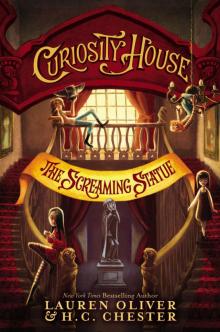 The Screaming Statue
The Screaming Statue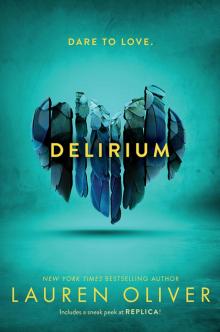 Delirium
Delirium Before I Fall
Before I Fall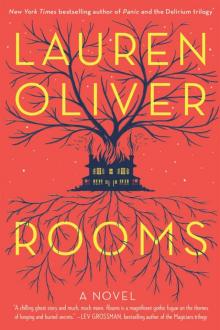 Rooms
Rooms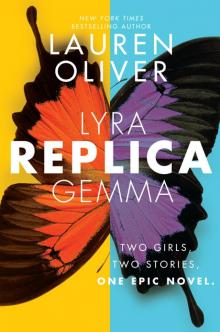 Replica
Replica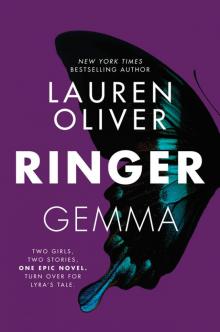 Ringer
Ringer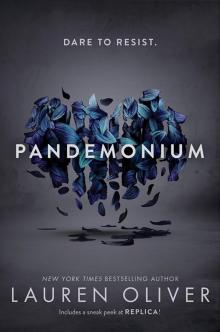 Pandemonium
Pandemonium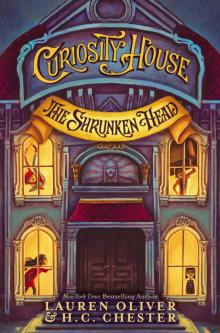 The Shrunken Head
The Shrunken Head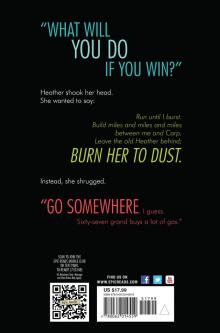 Panic
Panic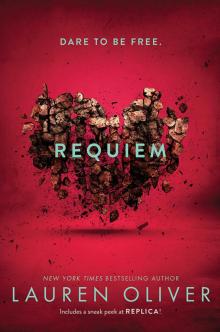 Requiem
Requiem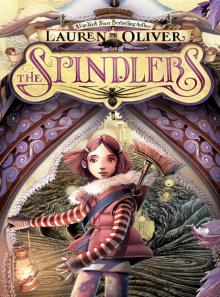 The Spindlers
The Spindlers Annabel
Annabel Liesl & Po
Liesl & Po Raven
Raven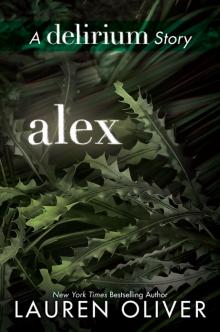 Alex
Alex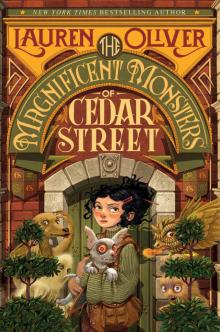 The Magnificent Monsters of Cedar Street
The Magnificent Monsters of Cedar Street Vanishing Girls
Vanishing Girls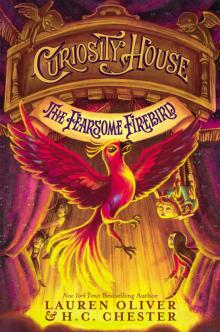 The Fearsome Firebird
The Fearsome Firebird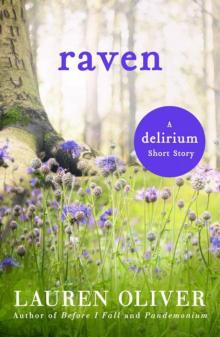 Raven: A Delirium Short Story
Raven: A Delirium Short Story Annabel: A Delirium Short Story
Annabel: A Delirium Short Story Hana: A Delirium Short Story
Hana: A Delirium Short Story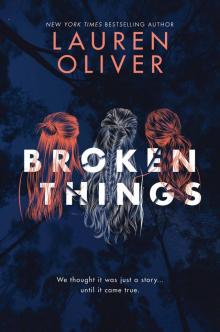 Broken Things
Broken Things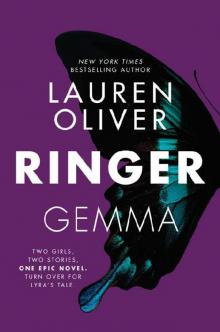 Ringer (Replica)
Ringer (Replica) Alex (delirium)
Alex (delirium)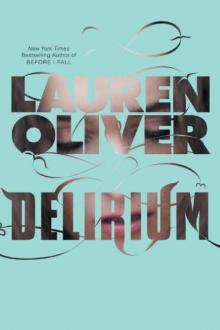 Delirium dt-1
Delirium dt-1